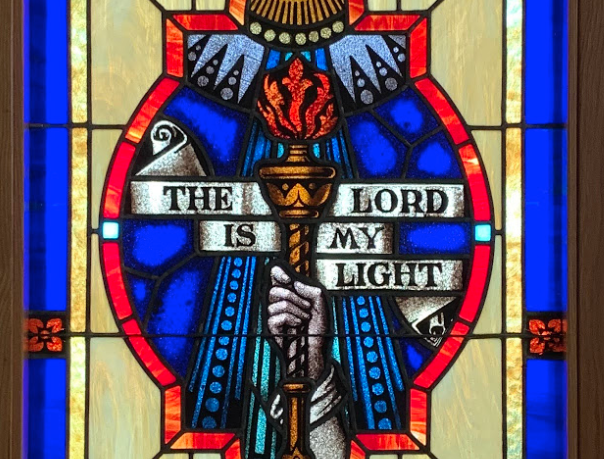Confidently Call on the Lord
Watch the service

Read the sermon
Always Pray For Justice
Laugh or Lash out? Long ago I had a teacher who was an evolutionist. He didn’t teach us much science. But he did teach us a great deal about evolution. He taught us that slowly, over long spans of time, simple organisms evolved for one purpose: survival. And he used an illustration. He told us that the reason that little babies look like their parents is for survival. If the children look like the parents, then the parents are less likely to neglect them. So love was an illusion. Love was just a trick nature played on you for the sake of survival. That’s what he taught. And one day we had a big gathering at school. And the teachers brought their family to the gathering. And he brought his little toddler girl with him. He laughed at her and with her. He held her and fed her. To put it different way: he loved her and everyone could see it. At first, I was amazed at how much he loved her. Then, I realized that what he lived out in his life completely contradicted what he taught in the classroom. What do you do when you see that kind of injustice? Do you laugh or do you lash out in anger? There are times when we cannot lash out in anger. So the only tool we have is to laugh. That’s the sort of context we find ourselves in at the beginning of Luke 18: “1 Then Jesus told his disciples a parable to show them that they should always pray and not give up. 2 He said: “In a certain town there was a judge who neither feared God nor cared what people thought. 3 And there was a widow in that town who kept coming to him with the plea, ‘Grant me justice against my adversary.’” (Luke 18:1–3 NIV11-GKE)
As we begin to walk through these words, we need to see that this was injustice with a capital “I.” Widows in ancient times were very vulnerable. Since their husband was gone, they had no one to earn the income for them. So they depended on the government both for income and also for justice and advocacy. And here we see a very sad and desperate situation. The institution that existed to help widows denied and neglected them. And in the words that follow, if we wonder whether we should laugh or lash out at this injustice, Jesus invites us to laugh: “4 “For some time he refused. But finally he said to himself, ‘Even though I don’t fear God or care what people think, 5 yet because this widow keeps bothering me, I will see that she gets justice, so that she won’t eventually come and attack me!’ ”” (Luke 18:4–5 NIV11-GKE)
It’s hard to not get angry, isn’t it? We hear what it in this judge’s heart. He doesn’t care about God. He doesn’t care about people. The only person he cares about is himself. He holds all the cards and all the power. But then we are introduced to this widow. Everything she has is about to be taken away from her. So she takes stock of her resources and tools and makes use of them. What is it that she still has? She has her time and she has her voice. So she makes it her mission to make this judge miserable. At every opportunity and seemingly around every corner, there she is, crying out for justice. And shockingly, she gets her justice—but not because of the reason we might think or want. She doesn’t get justice because the judge changes his mind and wants to be good and upright. No, remember, the only person he cares about is himself. And her constant complaining is getting in the way of his time and his life. And he resolves to give her what she wants so that he doesn’t get bullied anymore by her.1 From here though, Jesus quickly changes the tone of his words. We are invited to laugh along with the widow, for she got her justice. But then Jesus invites us to grieve: “6 And the Lord said, “Listen to what the unjust judge says. 7 And will not God bring about justice for his chosen ones, who cry out to him day and night? Will he keep putting them off? 8 I tell you, he will see that they get justice, and quickly.” (Luke 18:6–8 NIV11-GKE)
If you understand these words correctly, they hurt. Jesus here is making an argument “from bad to good.”2 If the widow does not cease to pray for justice and she’s talking to a wicked judge, how much more should we pray for justice since we have a good and righteous judge in heaven? Here is where we see our weakness and our failings. Jesus hears our cries for help. The word that Jesus uses here is the sort of bellowing that animals do that moves our heart to care.3 Jesus hears our own crying and bellowing for justice. And he not only hears, he also acts swiftly.4 He hears and he acts. But there are times when we can treat Jesus as if he were the unjust judge. How so? If we trusted that he were a good and righteous judge, we’d be praying boldly and optimistically for justice all the time. And I know in my own heart that this isn’t the case. In our last verse Jesus gets at the real problem: “However, when the Son of Man comes, will he find faith on the earth?”” (Luke 18:8 NIV11-GKE)
The real problem in our lives that is that pain can replace prayer. When there are times in our lives when someone can hurt us—really hurt us, it’s ever-so-easy to have the pain take over our hearts. And in these words we can see what can happen when the pain takes over our prayers for justice. Jesus promises to bring justice swiftly. And because all the room in our hearts is taken up with pain, we cannot trust that Jesus can bring justice that we cannot see. And because all the room in our hearts is taken up with pain, we even miss out on seeing the justice that Jesus can bring about right in front of our eyes. And when the pain takes over our hearts we miss out on rejoicing that there will be a day when Jesus returns when completely and absolutely all justice is brought home.
How thankful we are that this real problem finds a real payment in Christ. For if you want to see injustice, look at Jesus. His family makes fun of him, and he still prays to his Father. His friends doubt him and then eventually deny him. And Jesus still prays to his Father. His enemies make fun of him and torture him, and yet he still prays to his Father. For his Father would grant him justice in his own time and way. And Jesus all of this for us, so that we would know that our sins of letting the pain replace our prayers for justice are forgiven.
We have a real payment for our sin. And, finally,we have real promise that he hears us. So my dear friends in Christ, let us take Jesus up on his invitation. Let us always pray for justice. As we do this, along with the pain in our hearts, there will be room for trust in Jesus. As we do this, our eyes will be opened to see the times in our lives when he does give us justice. And as we do this, we will be ready for that final day when justice is realized in heaven. Always pray for justice. Amen.
1 “ⲩ̈ⲡⲱⲡⲓⲁⲍⲏⲙⲉ·” (Luke 18:5 GNT-ALEX)
2 a malo ad bonum
3 “ⲃⲟⲱⲛⲧⲱⲛ” (Luke 18:7 GNT-ALEX)
4 “ⲉⲛⲧⲁⲭⲉⲓ·” (Luke 18:8 GNT-ALEX)



